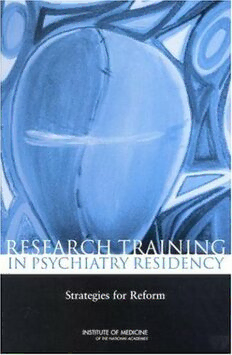Download Research training in psychiatry residency: strategies for reform PDF Free - Full Version
Download Research training in psychiatry residency: strategies for reform by Michael T. Abrams, Kathleen M. Patchan, Thomas F. Boat, Institute of Medicine (U.S.). Committee on Incorporating Research into Psychiatry Residency Training in PDF format completely FREE. No registration required, no payment needed. Get instant access to this valuable resource on PDFdrive.to!
About Research training in psychiatry residency: strategies for reform
The number of psychiatric researchers does not seem to be keeping pace with the needs and opportunities that exist in brain and behavioral medicine. An Institute of Medicine committee conducted a broad review of the state of patient-oriented research training in the context of the psychiatry residency and considered the obstacles to such training and strategies for overcoming those obstacles. Careful consideration was given to the demands of clinical training. The committee concluded that barriers to research training span three categories: regulatory, institutional, and personal factors.Recommendations to address these issues are presented in the committee's report, including calling for research literacy requirements and research training curricula tailored to psychiatry residency programs of various sizes. The roles of senior investigators and departmental leadership are emphasized in the report, as is the importance of longitudinal training (e.g., from medical school through residency and fellowship). As there appears to be great interest among numerous stakeholders and a need for better tracking data, an overarching recommendation calls for the establishment of a national body to coordinate and evaluate the progress of research training in psychiatry.
Detailed Information
| Author: | Michael T. Abrams, Kathleen M. Patchan, Thomas F. Boat, Institute of Medicine (U.S.). Committee on Incorporating Research into Psychiatry Residency Training |
|---|---|
| Publication Year: | 2003 |
| ISBN: | 309527414 |
| Pages: | 270 |
| Language: | English |
| File Size: | 1.439 |
| Format: | |
| Price: | FREE |
Safe & Secure Download - No registration required
Why Choose PDFdrive for Your Free Research training in psychiatry residency: strategies for reform Download?
- 100% Free: No hidden fees or subscriptions required for one book every day.
- No Registration: Immediate access is available without creating accounts for one book every day.
- Safe and Secure: Clean downloads without malware or viruses
- Multiple Formats: PDF, MOBI, Mpub,... optimized for all devices
- Educational Resource: Supporting knowledge sharing and learning
Frequently Asked Questions
Is it really free to download Research training in psychiatry residency: strategies for reform PDF?
Yes, on https://PDFdrive.to you can download Research training in psychiatry residency: strategies for reform by Michael T. Abrams, Kathleen M. Patchan, Thomas F. Boat, Institute of Medicine (U.S.). Committee on Incorporating Research into Psychiatry Residency Training completely free. We don't require any payment, subscription, or registration to access this PDF file. For 3 books every day.
How can I read Research training in psychiatry residency: strategies for reform on my mobile device?
After downloading Research training in psychiatry residency: strategies for reform PDF, you can open it with any PDF reader app on your phone or tablet. We recommend using Adobe Acrobat Reader, Apple Books, or Google Play Books for the best reading experience.
Is this the full version of Research training in psychiatry residency: strategies for reform?
Yes, this is the complete PDF version of Research training in psychiatry residency: strategies for reform by Michael T. Abrams, Kathleen M. Patchan, Thomas F. Boat, Institute of Medicine (U.S.). Committee on Incorporating Research into Psychiatry Residency Training. You will be able to read the entire content as in the printed version without missing any pages.
Is it legal to download Research training in psychiatry residency: strategies for reform PDF for free?
https://PDFdrive.to provides links to free educational resources available online. We do not store any files on our servers. Please be aware of copyright laws in your country before downloading.
The materials shared are intended for research, educational, and personal use in accordance with fair use principles.

